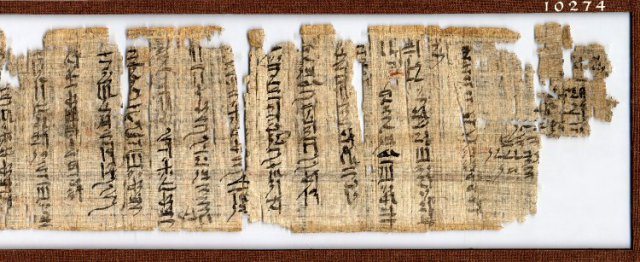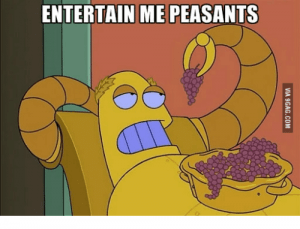
History has weaved great men into our lives and we do our best to imitate them when circumstance requires us to do so. The Social Justice Warrior (SJW) also imitates an ancient form. Regardless of what we define as intellectual, moral and technological progress the official political protest seems to be an atavism. But when, where and why did the SJW first make use of his method for achieving affluence and power? Is victim-hood a high virtue or praiseworthy method? And what is the limitation of this method?

A model figure to direct a man rightly on the ways of life and make him prosper on earth.
The original victim of the higher-born
The Tale of the Eloquent Peasant is a story of social justice thought to have been composed in Middle Kingdom Ancient Egypt, around the Twelfth Dynasty (1991 – 1783 BC). It is significant for one reason: it marks civilized man’s first awakening to social justice. A peasant named Khun-Anup lives with his family on the fringes of Egyptian high society making a meager living trading salt, an important commodity, thus he holds himself and his work in high esteem. Occasionally he travels to the more affluent parts of Egypt to trade his product.
In order to do this, he must pass the estates which are owned by nobles and managed by overseers. Since the land is private, he respectfully uses a path between the river and the cultivated fields. A typically middle class estate manager has an irrational prejudice against Khun-Anup. He covers the path, forcing the peasant to commit a crime against the noble by passing through the fields.
When Khun-Anup does this, his donkey eats some of the grain, amounting to theft. This is reason enough for the overseer to impound the peasant’s donkey and goods, as well as have him beaten. The higher-born overseer taunts and teases the peasant, insisting that nobody will hear his complaint about this treatment as injustices of this sort are a regular occurrence between the classes.
A degrading and repetitive method
Khun-Anup holds a grudge and vows that he will be heard by a superior. Through eloquent speech he makes his case. He manages to get the ear of the noble (basically he loiters around the private property shouting his protest every time the noble passes) and by appeal to his humanity and sense of fairness Khun-Anup wins him over. The noble however, has his own agenda and wants to win the favour of the Pharaoh.
He informs the Egyptian king about this eloquent peasant and the two collude to make Khun-Anup continue protesting by denying him his justice. Each time the peasant protests he is denied in order to have him improve the quality of his argument. Each protest is recorded by a scribe and heard by the king. This is done nine times with each protest a more convincing complaint about mistreatment and disadvantage against privilege and entitlement. In the end the peasant is pardoned, he gets his restitution and most significantly, he is elevated to the position of overseer while the unjust overseer himself becomes a peasant.
Circumstance and cosmic justice
What needs to be understood about circumstance in this case is that the Middle Kingdom was a period of reunification of the state, after having suffered from civil wars caused by the democratization of power. The kings of this period needed to cultivate loyalty to the central political authority, and since there was never any set of codified laws laid out to govern social behaviour in ancient Egypt, people enjoyed a freedom quite unique for the world at that time. Social justice therefore was based on a religious belief in cosmic or universal justice called maat , which was maintained by the divine Egyptian king.

Good speech is a hidden gem.
Equal and interchangeable
So what can we learn from this ancient parallel in order to gain some depth of knowledge regarding the contemporary SJW issue? First, it was reasoned that a political solution is required for any trivial infringement of personal rights, even when those personal rights do not exist. The implication here is that the central authority, government or pharaoh enjoys omnipotent power. Middle management simply doing their job protecting the interests of their superiors in a private matter is not exempt from central power goals and as far as the highest office in the state is concerned, the peasant and the overseer are completely interchangeable—or absolutely equal.
Second, regarding the psychology of the SJW, the outcome of the tale suggests that the goal was always the acquisition of individual power and wealth. Khun-Anup always had a self-important disposition through his commodity. What he eventually showed he wanted was the privileged position of the overseer and to witness the downfall of the one he thought privileged.
Third is the matter of virtue. Nine episodes of improving an argument of victim-hood and unjust treatment made the peasant progressively more qualified to take the overseers position, without the overseer getting a chance at self-defense. During the period of political protest and improved complaining the peasant’s family was compensated by the central authority for his absence. So his aspiration to be the supreme victim certainly was profitable, and subsequently can be deemed a lofty virtue by a specifically predisposed individual.

The rich man of last year will be the vagabond of this year.
The divinity of political authority
Khun-Anup had no other option but to continuously debase himself. There was no social mobility in his society, his only chance to achieve affluence and power was to persistently complain about injustice. In our society central government is not divine and certainly can’t rearrange the universal order to move a protester from poverty to power. The significant limitation is on the part of the political authority so pointing accusing fingers at historical villains can’t work because it only serves to further delegitimize the political role.
Conclusion
Thousands of years after the initial rise, we should have evolved beyond this enchanted idea of justice. When we aim to imitate ancient successes and rival the achievements of famous men we are not compelled to be the most eloquent vulnerable victim. Feeling included in a trend or movement may be one of life’s great joys, but consider the ancient form you are imitating and the type of character you want to weave into the lives of future generations.
Read the entire tale in: Lichtheim, M 1973. Ancient Egyptian Literature Volume 1: The Old and Middle Kingdoms. Berkeley: University of California Press.
Read More: The Most Important Way You Can Fight The “Social Justice” Collective
Leave a Reply